LEAD Evaluation Affirms Lasting Benefits of the Odyssey Project
Free humanities class builds confidence, sense of belonging to jump-start college careers
May 20, 2019 | By Karen Rivedal

Members of this year’s Odyssey Project course listen to a speaker during class. To be eligible for the free program, participants must demonstrate financial need.
A Madison community program that works to jump-start the college careers of low-income adults through a free six-credit humanities course is yielding more than just academic benefits for many students, according to the first external evaluation in the program’s 16-year history.
The evaluation found the Odyssey Project course helped students achieve an improved sense of self – a feeling of belonging in the world of organized education and a key predictor of success.
“The point is to get comfortable being at college level so they go on and stay in college after the class ends,” says Christine Pribbenow, director of the LEAD Center, which evaluates higher education programs locally and nationally for UW–Madison’s Wisconsin Center for Education Research in the School of Education. “The learning the Odyssey staff want to see is really that self-realization of, ‘Oh, I can do this. Now I want to take another course. Okay, now I want to get my bachelor’s degree.’”
Christine Bell, the assistant researcher who led the Odyssey Project evaluation, covering program years 2004 to 2016, agrees, noting the evaluation showed that “Odyssey participants start feeling better about themselves overall.”
 Bell
Bell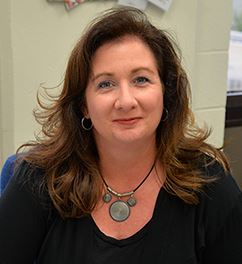 Pribbenow
PribbenowProgram alumni say much the same in the LEAD Center evaluation and in letters to staff.
“Odyssey turned my life around,” one participant said. “For the first time in my life, I felt like I belonged and had something valuable to bring to the world.”
The evaluation results also benefit the program itself, because they provide evidence of success that the Odyssey Project can use to gain further support of its programming.
Program seeks ‘whole family’ learning
A campus-community hybrid, the Odyssey Project is run by faculty and staff in UW–Madison’s Division of Continuing Studies but is offered at the Villager Mall on Madison’s South Side with the support of grants, donations and volunteers. The Odyssey Project takes a “whole-family approach” to breaking the cycle of generational poverty through education with a related enrichment program known as Odyssey Junior added in 2015 for the children and grandchildren of Odyssey students and alumni.
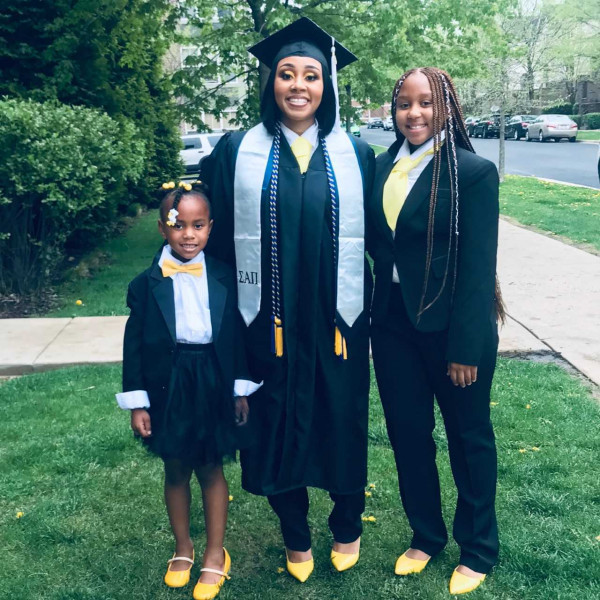
Dominique Christian, an Odyssey Project course alumna, earned a bachelor’s degree from UW–Whitewater this May and made her graduation a family celebration. Her personal triumph also makes her one of the program’s biggest success stories. Christian received financial assistance and advising through Onward Odyssey, an ancillary program, to help her graduate.
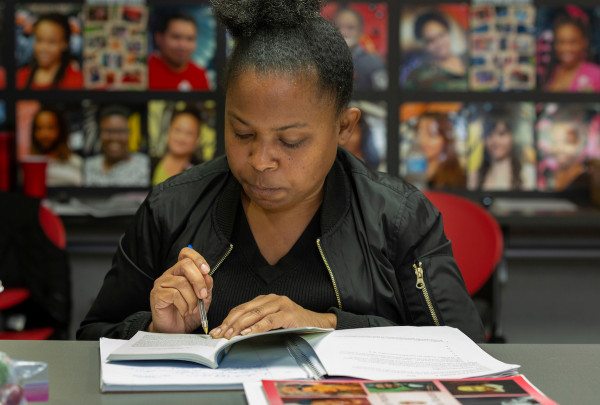
Quishanta Cary studies material from the six-credit humanities class offered through the Odyssey Project to get low-income people on track to a college degree.
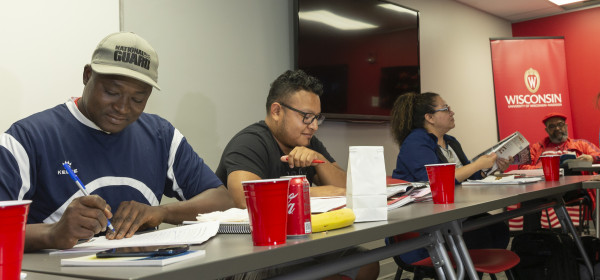
Odyssey Project students build confidence and a sense of belonging during the class.
“Overall our ambition is to help more families connect to higher education and envision it as part of their future,” says Odyssey Project Director Emily Auerbach. “So they get UW–Madison photo IDs. We take them to campus for visits, and it is a foot in the door of a great university. We do have some (adult Odyssey) students who have gone from homelessness to (earning) bachelor’s and master’s degrees.”
Founded in 2003, the adult Odyssey course boasts more than 400 alumni, most of them members of racial and ethnic minorities and 75 percent of them parents. Ranging in age over the years from 18 to 71, students in the class are limited to 30 annually and are taught by a team of university faculty members. The class introduces them to great works of literature, philosophy, history and art as a means of helping them find their own voices and improving their skills in writing and critical thinking.
Some program alumni describe the class as life-altering, with distinct before-and-after phases.
“When I was accepted into the Odyssey Project, I was a homeless single mom with no income or sense of purpose,” one participant said. “Now I have a UW bachelor’s degree and stability through employment and am starting my own businesses rooted in passion and purpose. Upward progress rooted in this love for learning! Thanks to Odyssey and Odyssey Junior, my sons talk about when -- not if -- they will go to college.”
Outside analysis sought insider cred
Previously evaluated through annual internal reviews, the program needed to have a third-party independent evaluation in part because many granting agencies require that, Auerbach said, and to gain a deeper understanding of the course’s impact on students.
To plan the evaluation, Bell met with program staff and a small group of student alumni to determine what questions needed to be answered and how a survey should be designed. Survey words were chosen carefully to ensure questions were clear and culturally responsive.
“We made a lot of changes based on (feedback) because we really wanted it to be a collaborative process,” Bell says. “It was important to have community engagement in the spirit of how the program itself works.”
The LEAD Center sent the survey to 354 adult alumni. More than 190 individuals, or 55 percent, responded. The center completed its 87-page report of evaluation findings in September 2017 and updated it in February 2018. An executive summary of major impacts shows program alumni reported:
- greater likelihood of continuing in college and earning degrees;
- improved economic stability;
- increased skills in writing, reading comprehension, and speaking;
- heightened sense of hope, fulfillment and civic engagement; and
- profound influence on their children, family and friends.
Specifically, all survey participants said they believed their writing skills improved as a result of taking the class, and nearly all felt more confident about pursuing further education and being prepared academically for college.
“Odyssey has given me hope,” one survey participant wrote. “I look forward to a never-ending journey of education to better myself as a man and father.”
“Odyssey has given me the courage to be myself and voice my opinions,” another said.
Broad benefits accrue despite continuing challenges
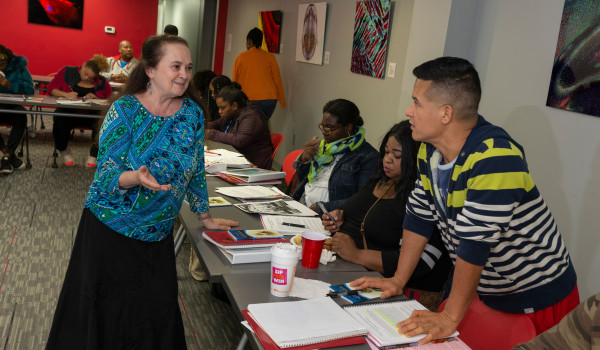
Odyssey Project Director Emily Auerbach, an English professor at UW–Madison, talks with student J. Luís Peréz-Olguín, standing, during a meeting of this year’s class.
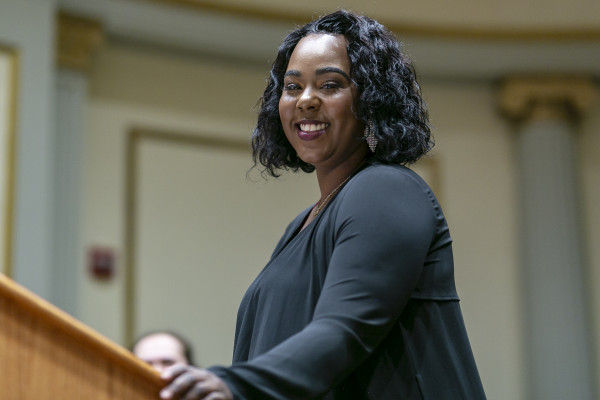
Ebony Anderson, a member of this year’s Odyssey Project course, takes part in a program graduation ceremony this spring. Hedi LaMarr Photography
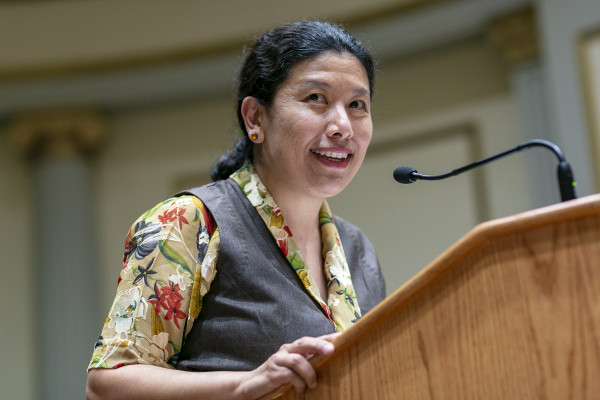
Odyssey Project course student Yangchen Lhamo speaks during a program graduation ceremony earlier this spring for family and staff. Hedi LaMarr Photography
The survey also shows fully three quarters of Odyssey Project alumni continued enrolling in college coursework, with a quarter of those earning a college degree or professional/technical certificate.
And course benefits appeared to extend to participants’ family members -- more than two-thirds believed their Odyssey experience heightened their children’s interest in attending college, while nearly all said it helped them better support their children in school.
That’s what comes of experiencing UW–Madison first-hand, Bell says, through the course materials, interacting with faculty and staff and taking field trips on campus during the academic year.
“There’s a difference between driving or walking through a college campus with your children and not having a connection compared to now, when Odyssey alumni can tell their kids, ‘This is what happens in this building,’ and ‘I know a person who works in that building,’” Bell says. “Odyssey alumni are more integrated into the university community and may feel more welcome to participate in events on campus.”
But barriers to higher education access remain challenging. The Odyssey course itself cannot address long-term challenges such as students' lack of time and money to continuously take classes, especially as many of the program's students also work and care for a family.
The program has been trying to address those broader societal challenges in recent years through an ancillary program known as Onward Odyssey, which offers program alumni additional free college courses and other assistance including academic, career and financial advising.
Evaluation cited as a model
Program staff also created marketing materials incorporating key evaluation results.
“The fact that the program was able to develop this useful tool is great,” Bell says. “To have the marketing pieces out there as evidence of Odyssey’s long-lasting impacts is nice. Everything the program could gain from sharing this document, in terms of more support, more money, that’s awesome. That’s what we were hoping for and it makes our work more rewarding.”
Bell now has an ongoing working relationship on data analysis with Auerbach and Colleen Johnson, Odyssey’s director of development and community partnerships.
“They contact us whenever they have data needs,” Bell says. “So whenever Colleen, for example, needs me to pull the data up again and look for something specific that maybe a donor or potential funder is asking of her, then I’m able to do that using the evaluation.”
Since the Odyssey Project evaluation, Bell’s survey has been highlighted and held up as a model for evaluators of similar programs around the nation in a report prepared by Vivé Griffith of the Clemente Course in the Humanities.
“That shows how our work can be used by different projects,” Pribbenow says. “It took a lot of time to create that survey tool, so if other programs can use the same tool, that saves them a lot of time.”


